
Register with Plumtri!
Register on plumtri as an Individual or as an Organisation to gain access to all of its useful features and remain updated on the latest R&I news, events and funding opportunities.
-
 Welcome to plumtriA platform for Research & Innovation
Welcome to plumtriA platform for Research & Innovation -
 Looking for Funding?Check out the current open calls
Looking for Funding?Check out the current open calls -
 Register today to start receiving our monthly newsletter
Register today to start receiving our monthly newsletter -
 Looking to partner up?Search our list of registered profiles
Looking to partner up?Search our list of registered profiles -
 You have questions on a particular funding programme?
You have questions on a particular funding programme?
Calls for Funding
Filter
Calls
Business Plan (BP) Voucher
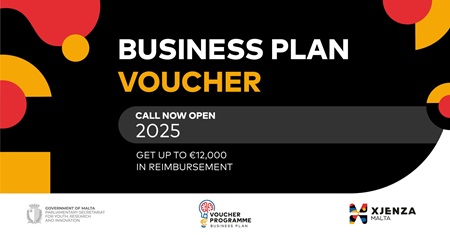
Source of Funding: Xjenza Malta
A business plan is a strategic document that outlines the financial and operational roadmap of a start-up. It acts as a blueprint for business growth, guiding entrepreneurs through critical decisions while attracting potential investors and financial institutions. A well-crafted business plan highlights revenue projections, market strategies, and operational objectives, ensuring long-term sustainability and success.
The primary goal of this plan is to demonstrate how the business will operate, generate revenue, and achieve its objectives. It provides insights into market trends, competition, and risk factors, while outlining strategies to navigate challenges and seize opportunities. Key sections include:
- Executive Summary — A concise overview of the business plan.
- Company Description & Management — Business structure and leadership team.
- Market Analysis & Strategy — Industry landscape, target audience, and competitive positioning.
- Business Model & Financial Plan — Revenue streams, cost estimates, and financial projections.
- Operational & Growth Strategy — Key milestones, risk assessment, and long-term vision.
By clearly defining goals and strategies, this business plan becomes a vital tool for securing investment and driving the entity’s success in a dynamic market.
Eligibility Requirement
To apply for the Business Plan Voucher, you must already hold an approved Xjenza Malta applied research grant.
This programme is designed specifically for researchers and innovators who have successfully reached the prototype stage (TRL 5+) with Xjenza Malta’s support.
| Programme Parameters | Details |
|---|---|
| Funding Available | Up to €12,000 (reimbursement) |
| Funding Percentage | 90% (De-minimis state aid, Option A) |
| Duration | 15 weeks to complete your business plan |
Required Forms
Forms and declarations required for submission, as outlined in the Rules for Participation, can be found on the resource page.
Applicants must submit the following:
-
- De Minimis Declaration Form
N.B.: All applicants must fill in the additional declarations form found within the application.
Submission Process
Completed application forms should be submitted electronically to voucher.xjenzamalta@gov.mt, keeping Kyle Bonnici (kyle.bonnici.4@gov.mt) in copy. Please use the subject line: “Business Plan – Voucher Submission.”
Important: It is the applicant’s responsibility to ensure that a confirmation of receipt is obtained.
Programme Closure Periods
The Voucher Programme will close once all funds have been allocated. Additionally, the programme will temporarily close during the following periods:
- 30 June 2025 to 31 August 2025
- 1 December 2025 to 9 January 2026
Applications submitted during these times will not be processed. If you submit an application during these periods, you may be required to resubmit after the programme reopens, incorporating any updates to the call documentation.
Contact Information
For further assistance, please contact:
Mr. Kyle Bonnici
Email: kyle.bonnici.4@gov.mt Phone: (+356) 2360 2209
Information and image source:
FCT Mobility Programme: Funding for International Research Exchanges in Portugal
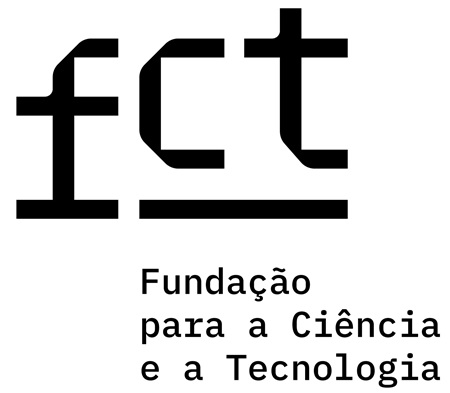
Source of Funding: Fundação para a Ciência e a Tecnologia (FCT)
The FCT Mobility Programme, launched by the Fundação para a Ciência e a Tecnologia (FCT) in Portugal, supports the international mobility of PhD researchers through medium- and long-term research stays. The programme funds research and/or fieldwork activities to strengthen international scientific cooperation.
Programme Structure
The programme offers two funding modalities:
- FCT Mobility Outgoing
For researchers affiliated with Portuguese institutions to undertake research in foreign institutions, for 2 to 11 consecutive months. - FCT Mobility Incoming
For foreign researchers (including Malta-based researchers) to conduct joint scientific activities in Portugal, for 1 to 3 consecutive months.
Applications for this stream must be submitted by the Portuguese hosting researcher.
Eligibility
Applications must be submitted by researchers who:
- Are integrated members of Portuguese Research Units, or
- Have a contractual relationship with an Associated Laboratory in Portugal.
Foreign researchers (e.g. Malta-based researchers) can participate as visiting researchers under the incoming modality, but cannot submit the application themselves. The Portuguese partner must act as the applicant.
How to Apply
- Applications are open from 7 November 2024 until 31 December 2025, 17:00 (Portugal time), or until the allocated funds are exhausted.
- Submissions must be made in English via the online application form by the Portuguese Researcher:
FCT Mobility Application Form
Evaluation Criteria
Proposals are evaluated by international experts based on the following criteria:
Outgoing Applications:
A) Merit of the applicant researcher
B) Merit of the work plan
C) Career development impact
D) Merit of host conditions
Incoming Applications:
A) Merit of the Portuguese applicant researcher
B) Merit of the work plan
C) Career development impact
E) Merit of the visiting researcher
Final Score Formula:
FC = 0.35 A + 0.25 B + 0.15 C + 0.25 (D or E)
Evaluations occur at least every three months. Provisional results are communicated within one month of each evaluation round.
Funding Details
- Maximum funding per mobility: €27,027
- Total programme budget: €5,000,000 (funded under Portugal’s Recovery and Resilience Plan - RRP)
- Funding rate: 100% of eligible costs
- Disbursed as a single payment at the start of the mobility
- At least 185 mobilities are expected to be supported
Further Information
Questions about the programme can be directed to fct.mobility@fct.pt and more information can be found on the website: FCT Mobility Call - FCT
Information and logo source:
COST Open Call 2025
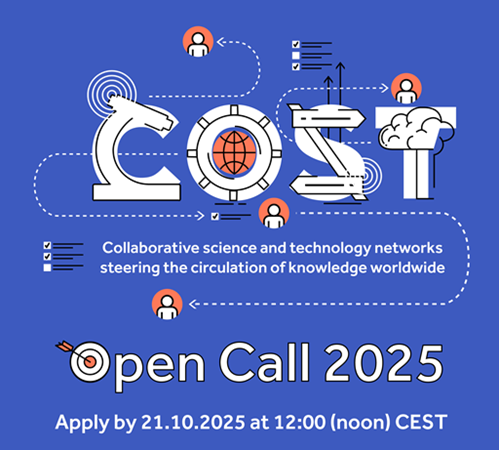
Source of Funding: European Cooperation in Science & Technology (COST)
A COST Action is an interdisciplinary research network that brings researchers and innovators together to investigate a topic for four years. Open to all science and technology fields, including new and emerging ones, COST Actions are also bottom-up meaning you can propose a network based on your own interests or ideas.
The funding a COST Action receives covers the expenses of networking activities and can be used to fund events, Short-Term Scientific Missions, Training Schools, communication activities, and virtual networking tools. A COST Action has an estimate budget of €125,000 in its first year and €150,000 per year for the other three years.
Participants are invited to submit a proposals that contributes to the scientific, technological, economic, cultural or societal knowledge advancement and development of Europe. Multi- and interdisciplinary proposals are encouraged.
The Open Call Action proposal submission, evaluation, selection and approval (SESA) procedure is fully science and technology-driven and will ensure a simple, transparent and competitive proposal evaluation and selection process, reflecting the bottom-up, open and inclusive principles of COST.
Visit the below link to read further.
Information and image source:
Cascade Funding Opportunities Closing in May 2025
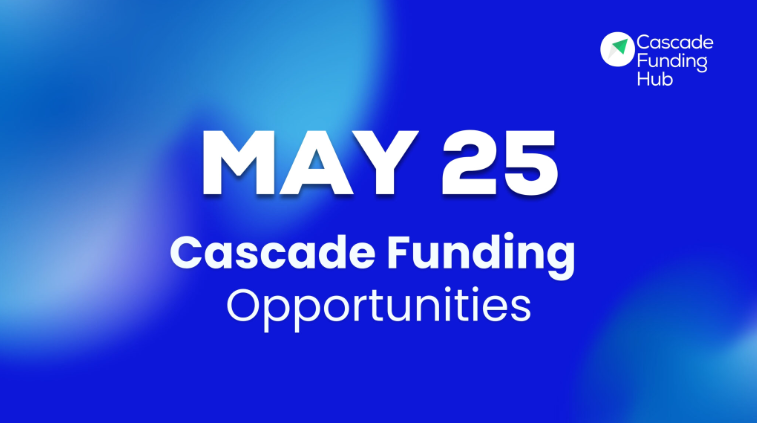
Visit the below link to view the 19 funding opportunities under Cascade Funding, an instrument by the European Commission.
Please note that these calls have different deadlines within the month of May 2025.
Information and image source:
CEF Energy 2025 Call for Proposals
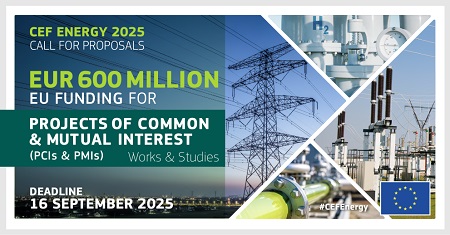
Source of Funding: CINEA - European Climate, infrastructure and Environment Executive Agency
The new CEF Energy call makes available €600 million from the EU budget to co-finance studies and works for both PCIs and PMIs. The call will close on 16 September 2025.
Projects in the fields of electricity, smart electricity grids, CO2 networks, hydrogen and electrolysers, and offshore, included in the latest PCI and PMI list can apply for funding.
Check the call in the Funding and Tenders Portal:
- Electricity, Gas, Smart Grids, Hydrogen and CO₂ networks - Works: CEF-E-2025-PCI-PMI-WORKS
- Electricity, Gas, Smart Grids, Hydrogen and CO₂ networks - Studies: CEF-E-2025-PCI-PMI-STUDIES
A CEF Energy info day to present the call explain its policy context and inform about the application and evaluation process will be held virtually on 22 May 2025 in the morning.
More information on the policy context and projects targeted by the call is availabile on the below link.
Information and image source:
Cascade Funding Opportunities closing in April 2025
Visit the below link to view the 22 funding opportunities under Cascade Funding, an instrument by the European Commission.
Please note that these calls have different deadlines within the month of April 2025.
Information and image source:
Xjenza Malta – Consiglio Nazionale delle Ricerche (CNR) 2025 Joint Call for Research Proposals
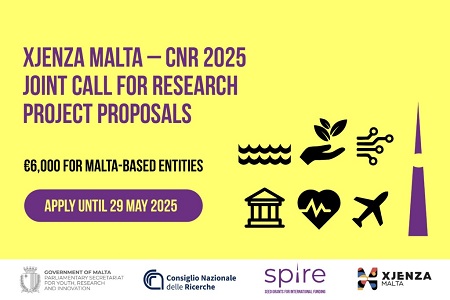
Source of Funding: Xjenza Malta and Consiglio Nazionale delle Ricerche (CNR)
Xjenza Malta and the Consiglio Nazionale delle Ricerche (CNR) have launched the 2025 Joint Call for Research Proposals under the SPIRE Programme. This initiative aims to strengthen research collaborations between Malta-based and CNR researchers by providing seed grants for small-scale projects that pave the way for larger future research efforts.
The SPIRE: Seed Grants for International Research Programme enhances Malta’s international research collaboration by facilitating joint calls with international partners. Through multi-annual calls, SPIRE supports projects that foster research partnerships, promote knowledge exchange, and serve as a foundation for larger-scale initiatives.
Funding & Project Details for the Xjenza Malta-CNR Joint Call
- Funding: Up to €6,000 for the Malta-based consortium (at least one Malta-based partner). The financial contribution to Malta-based entities shall be 100% of the eligible costs incurred.
- Project Duration: 24 months (1 January 2026 – 31 December 2027)
- Application Deadline: 29th May 2025, 12:00 PM CET
- Technology Readiness Levels (TRL): 1–7
Thematic Areas
Proposals must align with at least one of the following focus areas:
- Marine and Maritime
- Digital Technologies
- Health
- Sustainable Use of Resources
- Smart Manufacturing
- Aerospace, Aviation, and Space
- Cultural Heritage
Who Can Apply?
Each consortium must include:
- At least one eligible Malta-based entity
- At least one CNR researcher
Projects should be balanced in terms of workload and funding distribution between the two partners.
Download the guidelines on eligibility and application forms from the below link.
Online Information Session
Xjenza Malta will be hosting an online information session on 27 March from 10:00 to 11:00 AM CET to introduce the SPIRE Programme and the Xjenza Malta – CNR 2025 Joint Call for Research Proposals. This session will cover key details about the call, eligibility criteria, and the application process. Interested participants can register here.
Information and image source:
Cascade Funding Opportunities closing in March 2025
Visit the below link to view the 21 funding opportunities under Cascade Funding, an instrument by the European Commission.
Please note that these calls have different deadlines within the month of March 2025.
Information and image source:
Call for Proposals RFCS-2025-JT-Big Tickets for Coal
Source of Funding: European Commission
Project results are expected to contribute to all the following impacts:
- Contribute to achieving the European Green Deal goals.
- Demonstrate overall positive environmental and, if relevant, health and safety impact of the technology and/or the approach pursued.
Expected Outcome:
Project results are expected to contribute to all the following outcomes:
- Contribute to the ambitious targets of the European Green Deal.
- Outline a continuation plan for technology scalability and greater expansion, ultimately linked to a viable business case.
- Provide high visibility dissemination of lessons learnt and continue to contribute to the development of skills and creation/conversion of jobs.
Objective:
The RFCS Research Programme (Council Decision (EU) 2021/1094) has the following research objectives for the coal sector:
- supporting the just transition of the coal sector and regions (Article 4).
- improving health and safety (Article 5).
- minimising the environmental impacts of coal mines in transition (Article 6).
The call objectives are:
- Repurposing of formerly operating coal and lignite mines or those in the process of closure and coal-related infrastructure including power supply services.
- Materials and waste reuse, and development of alternative materials, including recovery of critical raw materials.
- Land monitoring, modelling, stabilisation and/or restoration.
- Processing of methane emissions.
- Monitoring, management and/or treatment of mine water and water tables in coal mines in the process of closure and formerly operating mines.
Scope:
Applicants may submit proposals for either pilot or demonstration projects (see Articles 15 and 16 of Council Decision 2008/376/EC).
Proposals must be in line with Council Decision (EU) 2021/1094.
Proposals should address the application of innovative technologies related to one or two of the five call objectives listed above. If addressing two call objectives, proposals should clearly identify which work packages address which call objective(s).
Proposals must include an exploitation strategy outlining possible integration of the deliverables of the project (including the pilot/demonstrators) in an industrial environment and a preliminary assessment of their economic viability. Where relevant, they can also describe activities related to economic analysis for the purposes of constructing a business case or new business models.
Activities are expected to achieve technology readiness level 7-8 (TRL 7-8) by the end of the project.
In line with Article 2 of RFCS Council Decision (EU) 2021/1094, research and technological development funded under the RFCS must be in line with the Just Transition Mechanism goals.
Proposals will have to demonstrate how they will support the social and economic revitalisation of the former coal mine regions, in line with the relevant Territorial Just Transition Plans. Proposals must involve the local community and focus on communication with stakeholders, including the public.
Proposals are expected to include activities to:
- promote the development of efficient reskilling and upskilling programmes for workers affected by a coal phase-out, including research on the training and reskilling of workers employed or previously employed in the coal sector, in accordance with Article 4 (e) of RFCS Council Decision (EU) 2021/1094.
- address potential solutions that improve working conditions for employees of the coal mines being phased out, in particular health, safety, and ergonomics in and around the workplace, in accordance with Article 5 of RFCS Council Decision (EU) 2021/1094.
Visit the below link to read further.
Information source:
Call for Proposals RFCS-2025-CSP-Big Tickets for Steel
Source of Funding: European Commission
Expected Impact:
Project results are expected to contribute to the following impact:
- Contribute to the ambitious targets of the European Green Deal and the set of European Commission policy guidelines applicable to the steel industry for full decarbonisation of the steel sector.
Expected Outcome:
Project results are expected to contribute to all the following outcomes:
- Contribute and clearly quantify the CO2 reduction achieved in the steel sector or in the target group.
- Make it technically and economically feasible for novel technologies and processes to produce the same products as current industrial processes, as demonstrated and validated at suitable scale.
- Demonstrate overall positive environmental and, if relevant, health and safety effects of the technology and/or the approach pursued.
- Outline a plan for technology scalability and greater expansion, ultimately linked to a viable business case.
- Provide high visibility dissemination of lessons learnt and continue to contribute to the development of skills and creation/conversion of jobs.
Objective:
The RFCS Research Programme (Council Decision (EU) 2021/1094) has the following research objectives for the steel sector:
- new, sustainable and low-carbon steelmaking and finishing processes (Article 8).
- advanced steel grades and applications (Article 9).
- conservation of resources, protection of the environment and circular economy (Article 10).
- management of work force and working conditions (Article 10a).
The call objectives are:
- Cross cutting issues: digitalisation, skills and social innovation in the steel sector.
- CO2 neutral iron ore reduction (Increasing the use of pre-reduced iron carriers).
- Technologies to improve energy efficiency, increase heat recovery and enhance process integration (PI) approaches in steel production.
- Advanced steel alloys for special applications.
- Circular economy and sector coupling solutions to meet the zero-waste goal for steelmaking.
- Carbon capture of steel CO/CO2 gases.
Scope:
- Applicants may submit proposals for either Pilot or Demonstration projects (see Articles 15 and 16 of Council Decision (EU) 2008/376/EC).
- Proposals are expected to achieve technology readiness level 7-8 (TRL 7-8) by the end of the project. Research activities must take account of the requirements of the selected TRL levels.
- Proposals must be in line with the general and specific objectives listed in the Memorandum of Understanding for the European partnership on Clean Steel launched in Horizon Europe.
- Proposals need to show in the excellence and/or impact part of the application form how they contribute to the multiannual strategic R&I agenda of the Clean Steel Partnership.
- Proposals must address the application of innovative technologies related to one or two of the six call objectives listed above. If addressing two call objectives, proposals should clearly identify which work packages address which area(s) of which call objective(s).
- Proposals must include an exploitation strategy outlining possible integration of the outcomes of the project (including the pilot/demonstrators) in an industrial environment and a preliminary assessment of their economic viability.
- When addressing the call objectives, proposals should pay particular attention, where relevant, to Article 10a of RFCS Council Decision (EU) 2021/1094 and, more precisely, include activities to address potential solutions that can improve the working conditions of employees at steelmaking facilities, in particular health, safety and ergonomics in and around the workplace.
- Targeted improvements (compared to the existing installation or, for new projects, to the relevant ETS benchmark) must be clearly quantified and demonstrated with energy system and materials balance assessments (including emissions) clearly defined by the applicants. This requirement applies to all the call objectives, with the exception of objective 1.
- Collaborations with start-ups and small and medium-sized enterprise are encouraged.
Visit the below link to read further.
